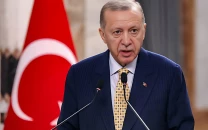US adopts rules easing path to green cards for abused, neglected minors
USCIS expands the pool of individuals who are eligible for ‘special immigrant juvenile’ status

US immigration authorities released new policies on Monday that will make it easier for immigrant minors who are victims of parental abuse and neglect to qualify for green cards, finalising changes first proposed more than a decade ago.
The rules from US Citizenship and Immigration Services (USCIS) expand the pool of individuals who are eligible for "special immigrant juvenile" (SIJ) status and clarify the types of evidence that must be submitted to support an application.
The programme created in 1990 allows immigrants under 21 to apply for permanent residency in the United States if a state court determines that they need protection and that returning to their home countries would be unsafe. Since 2010, more than 130,000 applications have been approved.
Immigrant advocates and attorneys have turned to the SIJ programme as one avenue to offer young migrants who had come from violent pasts a path to legal residency in the United States. But some critics have criticised the programme as a loophole that is too permissive and encourages more migration.
Also read: US to allow waiving of in-person interviews for H-1B, other visas through 2022
During the Trump administration, USCIS dramatically increased requests for documentation from applicants for SIJ status, drawing out many cases.
The agency also denied many petitions filed by applicants over the age of 18, reasoning that they were ineligible because state family courts lacked jurisdiction over them.
The rules adopted on Monday are designed to streamline the process, USCIS said, by making clear what types of documents are needed to prove eligible for SIJ status. They also make clear that any individual younger than 21 may apply for the programme.
USCIS Director Ur Jaddou in a statement said the policies would help children who are abused or abandoned rebuild their lives in the United States.
"These policies will provide humanitarian protection to vulnerable young people for whom a juvenile court has determined that it is in their best interest to remain in the United States," she said.


1725099588-0/BeFunky-(41)1725099588-0-208x130.webp)
















COMMENTS
Comments are moderated and generally will be posted if they are on-topic and not abusive.
For more information, please see our Comments FAQ